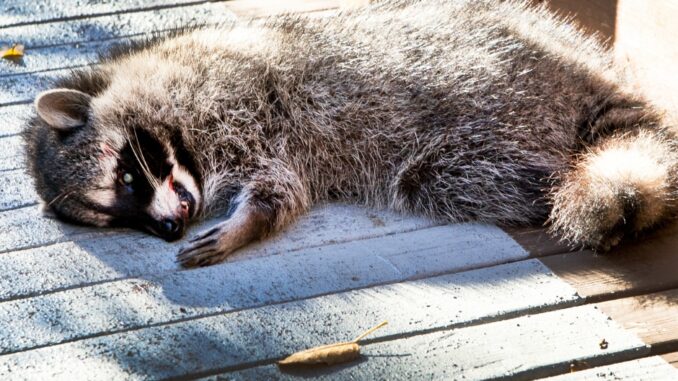
Discovering a deceased raccoon in your yard can be a disconcerting experience. While it’s important to handle the situation with care, it’s equally crucial to follow proper procedures for disposal. This blog post aims to provide guidance on what to do when faced with this unfortunate situation.
Table of Contents
Possible Causes of a Dead Raccoon in Your Yard:
- Disease Outbreaks: Raccoons can fall victim to various diseases, and an outbreak could lead to fatalities.
- Accidental Poisoning: Ingesting toxic substances, intentionally or unintentionally left out, could result in a raccoon’s death.
- Predator Attacks: Raccoons face threats from larger predators, and an attack could lead to a fatal outcome. Identifying signs of predator involvement and ensuring safety measures.
What to Do with a Dead Raccoon in Your Yard:
Do Not Touch or Disturb
Upon finding a dead raccoon, it’s essential to resist the urge to touch or disturb the animal. Raccoons may carry diseases such as rabies, and their remains could pose health risks. Keep a safe distance and avoid direct contact.
Contact Local Animal Control:
The first step in dealing with a deceased raccoon is to contact your local animal control or wildlife management authorities. They are trained to handle such situations and will provide guidance on the appropriate steps to take. Some municipalities may offer a removal service for dead animals. You can also call trusted private dead raccoon removal services.
Proper Removal Techniques:
If permitted, carefully use a shovel or other tools to place the raccoon in a sturdy garbage bag. Tie the bag securely and dispose of it according to local regulations.
Double-Bagging for Disposal:
When transporting the raccoon, double-bagging is a recommended practice. Place the carcass in a sturdy plastic bag and then put it into another bag. This helps contain any potential contaminants and minimizes odors.
Health Precautions:
Wash your hands thoroughly after handling the raccoon or any tools used in the removal process. Disinfect the area where the raccoon was found to minimize the risk of contamination.
Use Personal Protective Equipment (PPE):
If it is absolutely necessary to move the raccoon before animal control arrives, use proper personal protective equipment. Wear gloves, long sleeves, and pants to minimize the risk of direct contact. Be cautious not to touch your face during the process and wash your hands thoroughly afterward.
Choose a Safe Disposal Method:
Once properly bagged, the next step is to decide on an appropriate disposal method. Check with your local authorities for regulations on animal carcass disposal. Options may include bringing the raccoon to an approved facility or arranging for a pickup service.
Avoid Burial on Your Property:
It is generally not advisable to bury a dead raccoon on your property. Local regulations may prohibit this, and improper burial could lead to environmental contamination. Always adhere to guidelines provided by your municipality.
Understanding the Cause of Death:
If possible, try to determine the cause of the raccoon’s death. Common causes include disease, accidents, or poisoning. Knowing the cause can help you take preventive measures to avoid similar incidents in the future.
Disinfect the Area:
After the raccoon has been removed, take the time to thoroughly clean and disinfect the area where it was found. This helps reduce the risk of disease transmission and ensures a safe environment for humans and pets.
Preventing Wildlife Encounters:
Secure garbage cans with tight-fitting lids to discourage raccoons from rummaging through your trash. Seal any potential entry points to your home or yard to prevent raccoons from nesting.
Frequently Asked Questions (FAQs) About Dealing with a Dead Raccoon in Your Yard
Q1: What should I do if I find a dead raccoon in my yard?
A: If you discover a deceased raccoon, it’s advisable to contact your local animal control or wildlife management authorities. Reporting the findings ensures that professionals handle the situation appropriately, minimizing health risks and adhering to regulations.
Q2: Can I remove the dead raccoon from my yard by myself?
A: While it’s possible to handle the removal personally, it’s crucial to prioritize safety. Use protective gear, such as gloves and a mask, and follow guidelines for proper disposal. However, opting for professional dead raccoon removal services is often recommended for a secure and efficient process.
Q3: Are there any risks associated with improper disposal of a dead raccoon?
A: Improper disposal can attract other wildlife and pose environmental risks. It’s essential to follow approved disposal methods, including burial or cremation, to prevent the spread of diseases and maintain a safe environment.
Q4: Can I bury the dead raccoon in my yard?
A: Depending on local regulations, burying the raccoon may be an option. Ensure that the burial site is far from water sources and follow guidelines to prevent contamination. Professional advice or services can provide clarity on the appropriate disposal method.
Q5: Are there any signs of diseases I should be aware of when handling a dead raccoon?
A: Yes, raccoons can carry diseases that pose risks to humans and other animals. Symptoms of common raccoon diseases include lethargy, disorientation, and abnormal behavior. It’s crucial to exercise caution, use protective gear, and seek professional assistance to minimize health hazards.
Conclusion:
Dealing with a deceased raccoon in your yard requires a careful and responsible approach. By following these steps and cooperating with local authorities, you can contribute to the safe and proper disposal of the raccoon while minimizing potential health risks for yourself and your community.
